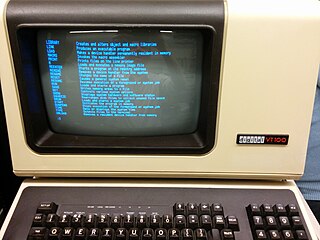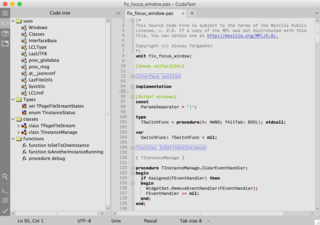In computing, serialization or serialisation is the process of translating a data structure or object state into a format that can be stored or transmitted and reconstructed later. When the resulting series of bits is reread according to the serialization format, it can be used to create a semantically identical clone of the original object. For many complex objects, such as those that make extensive use of references, this process is not straightforward. Serialization of object-oriented objects does not include any of their associated methods with which they were previously linked.

A shell script is a computer program designed to be run by the Unix shell, a command-line interpreter. The various dialects of shell scripts are considered to be scripting languages. Typical operations performed by shell scripts include file manipulation, program execution, and printing text. A script which sets up the environment, runs the program, and does any necessary cleanup or logging, is called a wrapper.
Yacc is a computer program for the Unix operating system developed by Stephen C. Johnson. It is a Look Ahead Left-to-Right Rightmost Derivation (LALR) parser generator, generating a LALR parser based on a formal grammar, written in a notation similar to Backus–Naur Form (BNF). Yacc is supplied as a standard utility on BSD and AT&T Unix. GNU-based Linux distributions include Bison, a forward-compatible Yacc replacement.
A filename extension, file name extension or file extension is a suffix to the name of a computer file. The extension indicates a characteristic of the file contents or its intended use. A filename extension is typically delimited from the rest of the filename with a full stop (period), but in some systems it is separated with spaces. Other extension formats include dashes and/or underscores on early versions of Linux and some versions of IBM AIX.

The Microsoft Windows Script Host (WSH) is an automation technology for Microsoft Windows operating systems that provides scripting abilities comparable to batch files, but with a wider range of supported features. This tool was first provided on Windows 95 after Build 950a on the installation discs as an optional installation configurable and installable by means of the Control Panel, and then a standard component of Windows 98 and subsequent and Windows NT 4.0 Build 1381 and by means of Service Pack 4. The WSH is also a means of automation for Internet Explorer via the installed WSH engines from IE Version 3.0 onwards; at this time VBScript became means of automation for Microsoft Outlook 97. The WSH is also an optional install provided with a VBScript and JScript engine for Windows CE 3.0 and following and some third-party engines including Rexx and other forms of Basic are also available.
A programming tool or software development tool is a computer program that software developers use to create, debug, maintain, or otherwise support other programs and applications. The term usually refers to relatively simple programs, that can be combined to accomplish a task, much as one might use multiple hands to fix a physical object. The most basic tools are a source code editor and a compiler or interpreter, which are used ubiquitously and continuously. Other tools are used more or less depending on the language, development methodology, and individual engineer, often used for a discrete task, like a debugger or profiler. Tools may be discrete programs, executed separately – often from the command line – or may be parts of a single large program, called an integrated development environment (IDE). In many cases, particularly for simpler use, simple ad hoc techniques are used instead of a tool, such as print debugging instead of using a debugger, manual timing instead of a profiler, or tracking bugs in a text file or spreadsheet instead of a bug tracking system.
Jython is an implementation of the Python programming language designed to run on the Java platform. The implementation was formerly known as JPython until 1999.
In computer science, a NOP, no-op, or NOOP is a machine language instruction and its assembly language mnemonic, programming language statement, or computer protocol command that does nothing.
The printf format string is a control parameter used by a class of functions in the input/output libraries of C and many other programming languages. The string is written in a simple template language: characters are usually copied literally into the function's output, but format specifiers, which start with a % character, indicate the location and method to translate a piece of data to characters.
In computer programming, glob patterns specify sets of filenames with wildcard characters. For example, the Unix Bash shell command mv *.txt textfiles/ moves all files with names ending in .txt from the current directory to the directory textfiles. Here, * is a wildcard standing for "any string of characters except /" and *.txt is a glob pattern. The other common wildcard is the question mark (?), which stands for one character. For example, mv ?.txt shorttextfiles/ will move all files named with a single character followed by .txt from the current directory to directory shorttextfiles, while ??.txt would match all files whose name consists of 2 characters followed by .txt.
In some programming languages, eval, short for the English evaluate, is a function which evaluates a string as though it were an expression in the language, and returns a result; in others, it executes multiple lines of code as though they had been included instead of the line including the eval. The input to eval is not necessarily a string; it may be structured representation of code, such as an abstract syntax tree, or of special type such as code. The analog for a statement is exec, which executes a string as if it were a statement; in some languages, such as Python, both are present, while in other languages only one of either eval or exec is.
ALGOL 68C is an imperative computer programming language, a dialect of ALGOL 68, that was developed by Stephen R. Bourne and Michael Guy to program the Cambridge Algebra System (CAMAL). The initial compiler was written in the Princeton Syntax Compiler that was implemented by J. H. Mathewman at Cambridge.
In computer science, a finalizer or finalize method is a special method that performs finalization, generally some form of cleanup. A finalizer is executed during object destruction, prior to the object being deallocated, and is complementary to an initializer, which is executed during object creation, following allocation. Finalizers are strongly discouraged by some, due to difficulty in proper use and the complexity they add, and alternatives are suggested instead, mainly the dispose pattern – see problems with finalizers.
In computing, a shebang is the character sequence consisting of the characters number sign and exclamation mark at the beginning of a script. It is also called sharp-exclamation, sha-bang, hashbang, pound-bang, or hash-pling.

In computer programming, a comment is a programmer-readable explanation or annotation in the source code of a computer program. They are added with the purpose of making the source code easier for humans to understand, and are generally ignored by compilers and interpreters. The syntax of comments in various programming languages varies considerably.

In computing, help is a command in various command line shells such as COMMAND.COM, cmd.exe, Bash, qshell, 4DOS/4NT, Windows PowerShell, Singularity shell, Python, MATLAB and GNU Octave. It provides online information about available commands and the shell environment.
A scripting language or script language is a programming language for a runtime system that automates the execution of tasks that would otherwise be performed individually by a human operator. Scripting languages are usually interpreted at runtime rather than compiled.

Anaconda is a distribution of the Python and R programming languages for scientific computing, that aims to simplify package management and deployment. The distribution includes data-science packages suitable for Windows, Linux, and macOS. It is developed and maintained by Anaconda, Inc., which was founded by Peter Wang and Travis Oliphant in 2012. As an Anaconda, Inc. product, it is also known as Anaconda Distribution or Anaconda Individual Edition, while other products from the company are Anaconda Team Edition and Anaconda Enterprise Edition, both of which are not free.

Meson is a software tool for automating the building (compiling) of software. The overall goal for Meson is to promote programmer productivity. Meson is free and open-source software written in Python, under the Apache License 2.0.

CudaText, from Bosnian-Croatian-Montenegrin-Serbian čuda, is a free open source cross-platform native GUI text and source code editor. CudaText supersedes its predecessor SynWrite, no longer under development.






